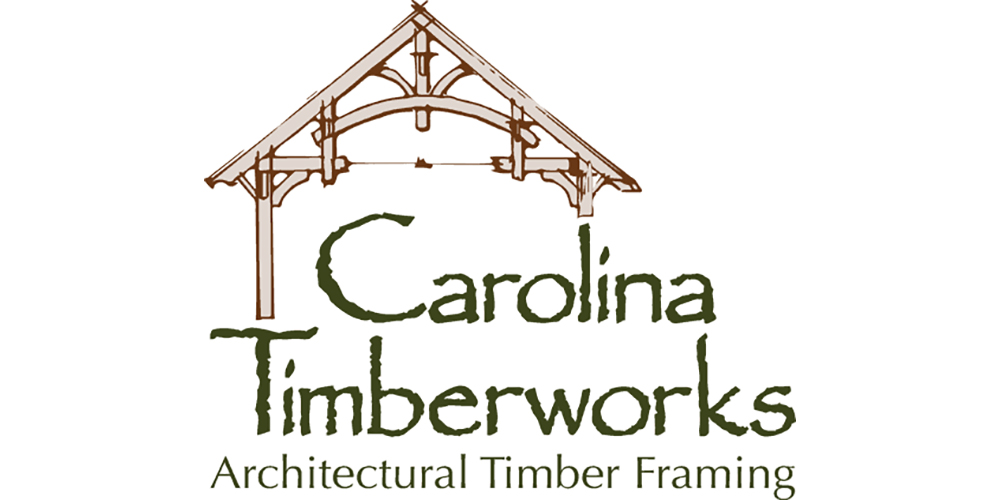Carolina Timberworks, a pioneer in the timber frame industry, stands out as a sustainability leader for its unique approach. As a designer and manufacturer of custom timber frame structures, they have crafted homes, barns, outbuildings, ‘party barns,’ and commercial structures like offices, churches, and outdoor market spaces. They have a rich 21-year history and over 350 projects completed nationwide and beyond.
Co-owned by Eric and Gesche Morley, Carolina Timberworks departs from the traditional process of building the timber frame structure on-site, instead prefabricating the structure in an indoor climate-controlled facility in West Jefferson, NC. This ensures higher quality, more efficient energy use and minimizes on-site time. Carolina Timberworks’ commitment to sustainability is evident in its construction process. Their craftspeople typically spend less than a week on-site, erecting a pre-cut structure quickly and with less waste. This process, powered by solar energy and state-of-the-art robotics, is a significant step towards achieving Net Zero carbon impact.
“Timber!”
“I grew up in Switzerland and France, moved to the U.S. when I was 15, worked in construction every college break as a laborer, graduated from Chapel Hill in 1986 with a BA in Political Science, and after failing to fly jets for the Navy, went to work in the wood business (for an import/export division of International Paper). By 1989, I was tired of traveling and earned my MBA at Appalachian State University in 1992.” Eric Morley continued, “One day, a friend invited me for coffee. Long story short, we built a timber frame manufacturing facility together and I worked there until I was fired in 2003 (for doing the right thing). I felt sorry for myself for a week, wrote a business plan in my closet office, and was turned down by two banks, but the third bank fully financed us, so I started the story of Carolina Timberworks.”
Timber frame structures stand out as distinctive and memorable, captivating both those in the construction industry and the general public. The main allure lies in these structures’ aesthetics and unique living experiences. Timber framing offers an architectural solution to a structural problem, diverging from conventional (2x) construction by leaving the structure uncovered by drywall. Instead, it remains visible, often regarded as a form of art. Upon closer inspection, one can appreciate the intricate craftsmanship where posts and beams are connected using pegged (wooden nails) wood-to-wood joinery – a time-honored construction technology with a history spanning over 2,000 years.
The popularity of Mass Timber, the use of large-format timber construction used structurally, including engineered wood products like glued laminated timber (glulam) and cross-laminated timber (CLT), as well as solid wood beams, is rapidly growing in the U.S., following the trend already well-established in Europe, with an average annual growth rate of 15% to 20%. The dual forces of sustainability, carbon sequestration and rapid and efficient on-site installation advantages fuel this surge. Additionally, the evolution of U.S. building codes to support environmentally-conscious material choices further boosts Mass Timber’s appeal. It emerges as an attractive alternative to traditional concrete and steel structures, garnering attention from the construction industry. It’s worth noting that timber framing, with its centuries-old history, is considered the original form of Mass Timber.
Carolina Timberworks’ commitment to sustainability is not just a statement but a practice that leaves a lasting impact on the environment. By using wood as the primary material for their buildings, they are not only embracing the practice of Mass Timber but also ensuring that the structures endure for centuries.
This dedication to wood as a default material showcases their commitment to sustainability and significantly reduces the carbon footprint, making a tangible difference in the fight against climate change. Traditional timber frame structures – like the Notre Dame Cathedral – still stand worldwide, a testament to hundreds of years of service and corresponding years of carbon sequestration.
“When people consider using wood in construction, the immediate association is often with deforestation. However, building a structure out of timber is arguably one of the most sustainable building practices. Using a paper towel or piece of white paper once and discarding it can be considered wasteful. In contrast, using timber to construct a building is sustainable; if kept dry, wood will last centuries – and the building becomes a large carbon sink. Even if the building is no longer in use, large posts and beams will be repurposed and utilized in constructing another building, making it the ultimate “renewable” resource,” explains Morley.
Sustainability: From the Inside, Out
The second element of Carolina Timberworks’ sustainability mission is using solar-generated power for all electrically powered equipment. “Carolina Timberworks is not resting on our laurels. We are committed to continually enhancing our sustainability practices. Our next step involves transitioning to electric-powered trucks for service and delivery, which will further reduce our carbon emissions. While current technology limits us to diesel-powered equipment, we are actively exploring options to make this transition. This forward-thinking approach is our ongoing commitment to reducing our environmental impact and staying at the forefront of high-performance, sustainable construction. We are excited about the future and the positive changes we can make in the industry,” proclaimed Morley.
Carolina Timberworks’ new, modern facility in West Jefferson is designed for optimal workflow. The installation of solar power, a commitment to the best tools and the use of CNC equipment contribute to a reputation for the highest quality and a willingness to tackle some of the most demanding challenges in the timber frame industry.
The company is known for completing seemingly ‘impossible’ jobs – including “Our customers, especially as younger generations of Millennials and GenZ rise in their careers and consider building custom homes, are keen to select vendors such as Carolina Timberworks that hold values consistent with theirs. We see this as a good business practice and another way to distinguish our products in the marketplace,” stated Morley.
“We are thrilled and honored to receive the 2024 Sustainability Leadership Award. At Carolina Timberworks, sustainability is at the core of everything we do. This recognition validates our commitment to building environmentally responsible timber homes and structures. It’s a testament to our team’s dedication to creating lasting, beautiful, eco-friendly spaces that stand the test of time,” exclaimed Morley.












